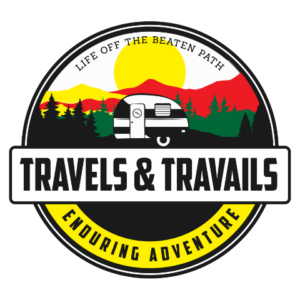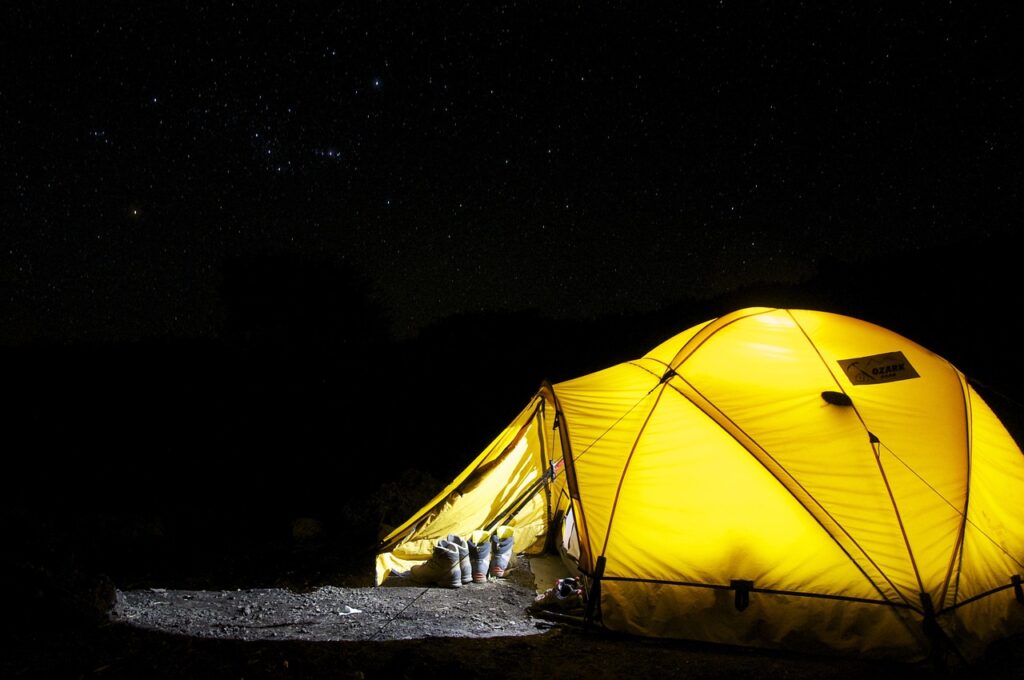
This is it, the moment you’ve been waiting for. You’re about to go on your first camping trip and you truly couldn’t be more excited. The nerves are also starting to build up as you think about how you’ll make it through. How do you survive your first camping trip?
Here are some survival strategies for your first camping trip:
- Never camp alone
- Go to a populated campsite or park
- Practice ahead of time
- Bring the essentials
- Learn how to layer
- Have more food and water than you think you’ll need
- Avoid overly strenuous activity
- Keep it short
This guide to surviving your first camping trip will tell you everything you need to know. Although it can seem scary and overwhelming at first, I promise that once you’re actually out there camping–especially if you follow these tips–that you’ll do just fine!
8 Tips to Make Your First Camping Trip a Breeze
1. Never Camp Alone
I know this first tip seems like a no-brainer, but you’d be amazed how many people forego it when camping for the first time.
You can watch every camping documentary and YouTube video and read every camping book on the shelf, but none of that replaces the experience of being out there and personally camping.
Camping can be hard the first few times, as you’re still learning all the ropes and figuring out where you like camping and for how long.
The only thing harder than those first few camping excursions is being by yourself.
If you struggle to light a fire, you’ll have to keep going until you get it. There’s no one there to help you.
If you trip and stumble on a rocky cliff when hiking, you’ll have to bandage yourself up. You don’t have a second person to do it for you.
Did you hear a creepy noise in the middle of the night? If you choose to investigate it at all, you can’t ask someone else to do it. You’d have to.
I recommend camping with a more experienced outdoorsperson, be that a friend, neighbor, or family member.
This person can teach you many things and gently correct you when you’re doing something wrong.
During your trip, be like a sponge. Absorb as much information as you can from this person so that one day, you can indeed stand on your own two feet and camp alone if that’s what you wish.
2. Go to a Populated Campsite or Park
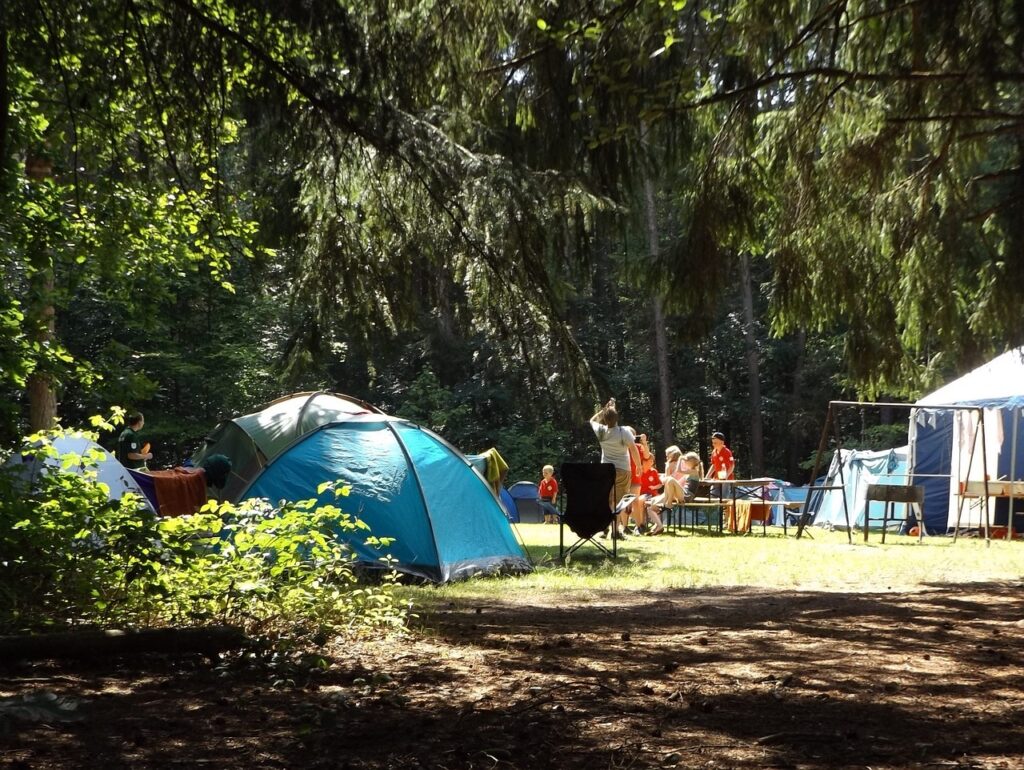
Most campers try to avoid busy places because of the human congestion. That’s why this next tip might seem a touch strange but trust me here.
Even if you’re camping with a small group for your first time out, you won’t be attached to the hip to those people. Some people will want to go do some things, others different things, and you’ll naturally separate throughout your trip.
As long as you have a predetermined meeting place and time and everyone reconvenes, then it’s fine.
However, I’m thinking about what you’ll do in those times when you’re truly alone.
Those moments may be few and far between as you’re just getting started with camping because your friends or family know you’re a beginner and won’t want to leave you unattended for too long.
At least if you’re in a populated campground or park, you can ask someone else for help if you’re struggling with something such as following trail markers or staking your tent in.
Plus, there’s the safety-in-numbers mentality.
If it’s just you and your buddies for dozens and dozens of miles out in a remote park, that’s going to make you feel uneasy as a beginner.
Heck, even more seasoned campers can be uneasy with a proposition like that!
The more crowded a campground is, the more at ease you might feel.
That said, please don’t let your guard down, especially your first time out, and ideally not ever.
People at campgrounds and parks generally have good intentions, but not exclusively. You probably have a higher chance of being killed by a wild animal than a person, but it’s tough to say for sure.
The reason? Disappearances and murders in parks are notoriously hard to attribute and even harder to solve.
I’m not telling you any of this to scare you, of course! I just want you to listen to your gut.
If someone seems sketchy, then dismiss yourself from the conversation, find your group, and keep your distance from that person or people until you go home.
3. Practice as Much as You Can Ahead of Time
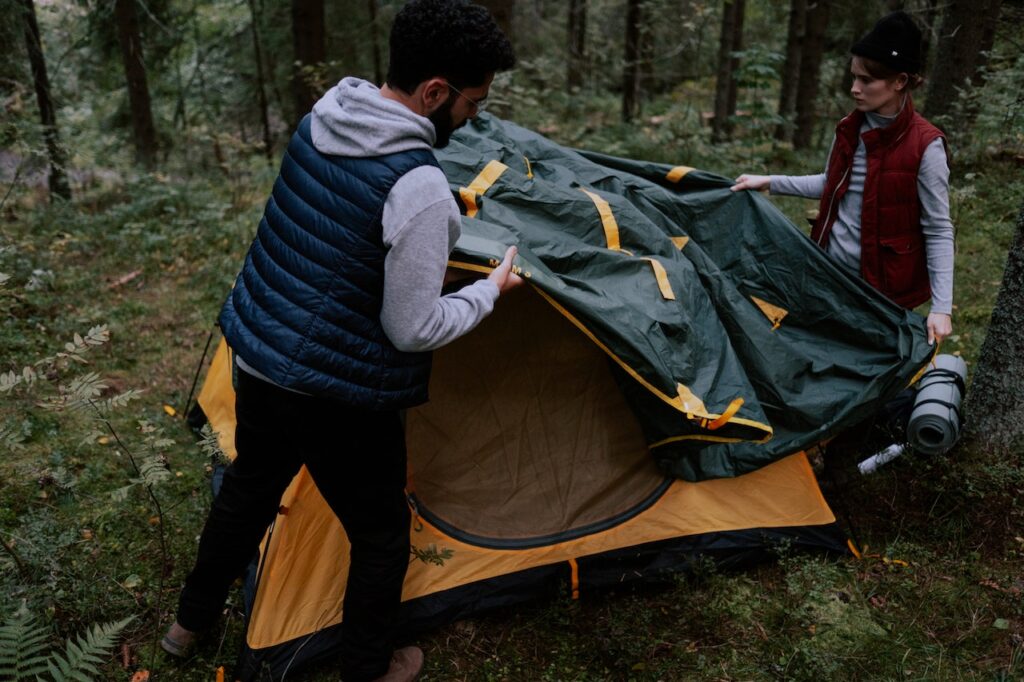
When camping, many assume that there’s only so much you can do ahead of your trip. To that, I say poppycock.
There’s a surprising number of activities you can do before you go camping that will better prepare you for the experience. Here’s what I recommend.
- Pitch a tent: In every TV show and movie where someone goes camping and has no idea what they’re doing, they always, always struggle to pitch a tent. That’s because it’s hard! Buy your tent well in advance and practice staking it in your backyard. You’ll feel like a pro by the time you get to the campground.
- Starting a fire: While starting a fire looks easy, looks can be deceiving. Everything from the amount of kindling you have to the wind speed and direction can influence your success. Start some fires in your yard but do so in different weather conditions so you’re readier to camp.
- Reading a map and compass: Who needs a paper map when there’s Google Maps? Compasses? Maybe not since you were a kid. You’ll have to familiarize yourself or refamiliarize yourself with both. You won’t have your phone as your guide when camping, so you must be able to navigate without it.
- Conditioning your body: While I don’t recommend going overboard with the activities on your first camping trip (more on that to come), you’re not going to want to sit around and do absolutely nothing while you camp. Training and conditioning yourself at the gym or even on an indoor rock climbing course will go a long way toward building your stamina and conditioning. That said, you want to start your exercise regimen months in advance to see results by the time you go camping.
- Reducing your reliance on technology: According to Exploding Topics, a trending topic resource, the average person spends more than three hours per day on their phones. For others, it can be more. Quitting your phone (and other electronics) cold turkey can be tough, so begin weaning yourself in 30-minute or 60-minute increments ahead of your camping trip. You’ll be glad you did!
- Learning to get comfortable with your own thoughts: I know, I know, this seems like such a small thing, but it truly is important. At night when camping, with no TV or phone to distract you, it’ll just be you and your own thoughts. Try to get used to that by meditating or taking blocks of silent time before you go camping.
4. Bring the Essentials (and Make a Checklist!)
After you’ve gone camping a couple of times, you’ll know the items you need like the back of your hand. Until you reach that point, it’s not a bad idea at all to make a checklist of the following essentials.
- Tent: I don’t think you’d forget your tent, but you never know! You need not only your tent but the stakes and a tent footprint as well. The footprint adds a waterproof floor underneath your feet so you’re literally not camping on the ground.
- Lighting: Whether you prefer a flashlight, a headlamp, or a lantern, you need some form of illumination for seeing your own two hands in front of your face at night. Be sure to pack plenty of extra batteries in case your headlamp or flashlight dies!
- Sleeping bag: A sleeping bag is the most common slumbering solution, although you could always bring a sleeping cot if you have the room. I’d suggest you buy a three-season sleeping bag so that almost no matter what time of year your first camping excursion is, you should be comfortable at night.
- Toiletries: Even if you’re only camping for a weekend, you still need toiletries. Bring shampoo and conditioner, toilet paper, soap, a towel, hand sanitizer, and any medications you take.
- Skin protection: To prevent stinging burns that will make you want to hide in your tent all day, you must have sunscreen. You also need insect repellant so your skin isn’t bitten to high heaven.
- First-aid kit: Do notrely on others in your party to bring a first-aid kit, as they might assume you’ll bring one. Even if you have more than one kit among your group, that’s just more supplies to go around.
- Cooler: How do you keep food and drinks frosty, especially in the summer? You won’t have a fridge, so a cooler is the next best thing when camping. Be sure to pack the cooler full of ice so it stays cold for longer.
- Camping stove: You can cook all your meals over a roaring fire if you want, but a camping stove is a suitable option as well. The stove should be portable and use a fuel source that you have readily available (i.e., not electricity).
- Utensils, plates, cups, and bowls: You’re not a savage, so you still want to eat with some humanity when camping. These items will make it easier to do so. I would recommend packing plastic instead of ceramic or glass. Disposable cups and cutlery are also a great idea when camping.
- Camping chair: When you want to take a load off, a camping chair is a great place to rest your weary bones. The chair should be lightweight and collapsible.
5. Learn How to Layer
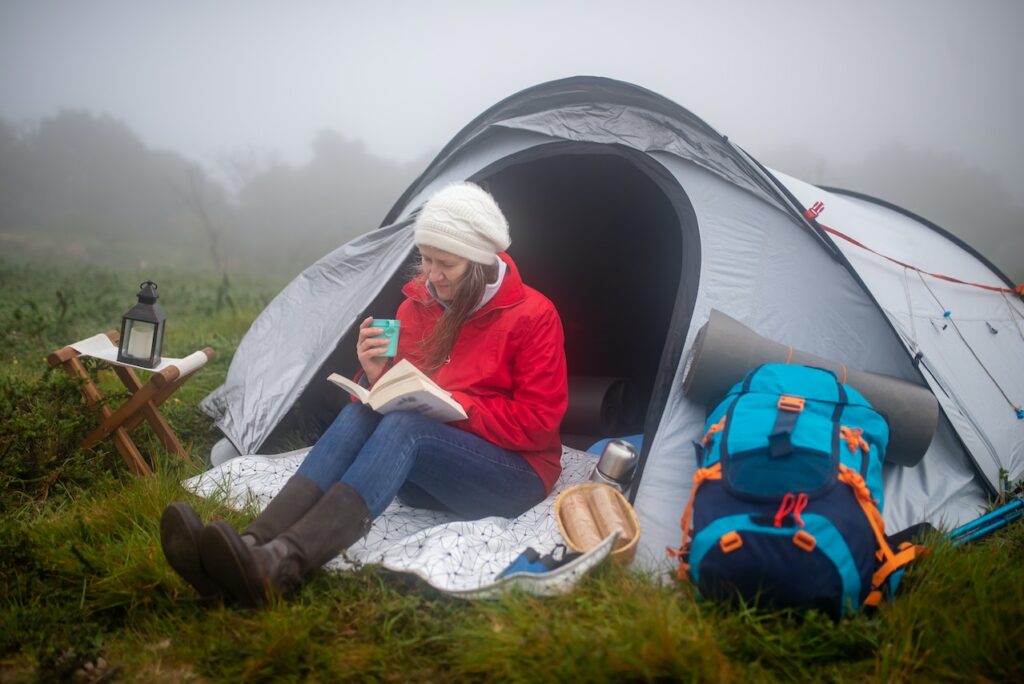
I wrote an extensive guide about layering on the blog that I highly recommend you check out if you missed it.
This subsection here will be a brief recap.
You need three layers when camping.
The first layer is the base layer, which is also known as the underwear layer. This is the layer that’s the closest to your body and weighs the least.
The base layer must be made of moisture-wicking material (no cotton here!) so that when you sweat, the fabric can pull the perspiration away. You won’t get stinky, and the sweat won’t stick to your body, either.
The next layer is the middle layer or insulating layer. This layer is heavier than the base layer and is designed to offer cold protection.
The third layer is the outer layer or shell layer. This is the weatherproof layer that safeguards you from rain and wind.
Although layering is most recommended when camping in the autumn and winter, you can and should still layer in the warmer months.
After all, just because it’s hot where you live in the summer doesn’t mean the same will be true at the park or campsite.
As you change elevations, the temperatures can sometimes drop rather quickly, leaving you shivering.
It’s always better to have more layers than fewer. After all, you can take layers off when you’re out on a hiking trip, but you can’t add more layers until you’re back at your base camp.
6. Have More Food and Water Than You Think You’ll Need
One of your concerns when camping for the first time might be that you’ll run out of food and water.
While anything could happen when camping, depleting your supply is something that’s completely preventable.
The only exceptions would be if a wild animal made off with your food or if someone happened to steal it.
You need at least a gallon of water per day of your camping trip. Multiply that number by however many people are in your camping group.
You should have at least a pound and a half of food per day and up to two and a half pounds. That’s again per person.
With that amount of food, you’ll ingest up to 4,500 calories a day. You need a higher caloric load when camping to compensate for your increase in physical activity.
Now that you know the baseline of how much food and water to bring, double the amount. If not that, then pack food and water for a few extra days.
If you know that you’re camping for only two days, then bringing four days’ worth of food will ensure you don’t run out.
7. Avoid Overly Strenuous Activities
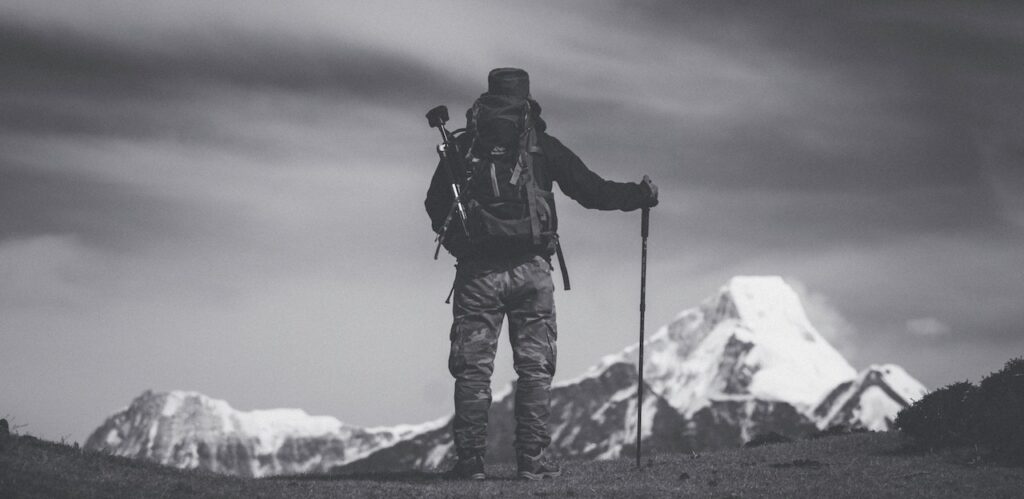
Going back to my point from before, I would tell you to shy away from intense activity during your first few camping excursions.
Why is that? For a multitude of reasons, really.
Even if you spend months training at the gym for a camping trip that will involve hiking or rock climbing, you’re not using the same muscles with the latter exercise as you are with the former.
There will be a degree of adjustment, which means sore muscles. You might not feel it much the first day but trust me when I say you’ll feel it the next morning. You’ll barely be able to walk!
Exhausting yourself physically can tire you mentally as well. You might forget what you learned about reading a compass or starting a fire.
Your wits won’t be about you, which means you could find yourself in a potentially dangerous situation because you’re not thinking clearly.
You’re also more injury-prone when you’re tired and unable to think straight. Maybe that means only sustaining a minor injury like a sprain or strain, but it could mean something more serious as well.
Stick to activities during the first camping trip that tire you out but don’t sap you of your energy entirely.
If you feel like you’re getting too exhausted to carry on to the next planned activity, be sure to let your group know.
They should be very understanding!
8. Keep It Short
My last tip for surviving your first camping trip is this: don’t camp for long.
I would recommend only an overnight stay for your first time out. Even a weekend can be a bit long.
I can’t stress enough that it’s going to be an adjustment. If you’ve never gone camping before or if you’re not very athletically inclined, then you’re in for a huge adjustment.
If you’re trying a new pair of shoes on, you don’t wear them for a mile. You put them on for a little bit and break them in.
It’s the same with camping. Stay one night at first, then two nights, and then more nights.
This is a failsafe in case you find that camping isn’t for you. After all, as much as I live and breathe camping on this blog, I can recognize that for a lot of reasons, it’s not something that everyone enjoys, and that’s okay!
At least if you’re only camping for 24 hours, you can rest easy knowing that you’ll be all snuggly and warm in your bed by the next night.
Conclusion
Surviving your first camping trip needn’t be stressful. Preparation is key, and the earlier you can start preparing (such as months in advance), the better.
I hope these tips inspire you to try camping for the first time!
